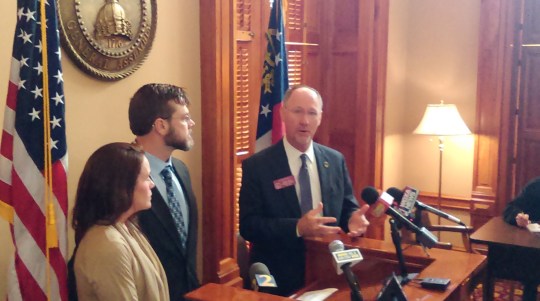Here’s the GHN list of the top 10 health stories in Georgia this year.
Let us know what we missed — or what we ranked too high or too low.
1. Ebola struck – and Atlanta responded
The disease that frightened the nation drew a major response from health care professionals in Georgia’s capital. Emory University Hospital treated the first Ebola patient ever in America, as well as one of the first two people to become infected in the United States. Meanwhile, the Atlanta-based CDC sent hundreds of workers to fight the epidemic in West Africa. And the agency issued revised recommendations on what type of protective equipment should be worn by health care workers treating Ebola patients.
2. ACA exchange enrolled more than 316,000 Georgians
Despite the early technical catastrophe of the healthcare.gov website, thousands of Georgians chose a health plan, while thousands more were found eligible for Medicaid and PeachCare during the enrollment process. More are expected to sign up during the current open enrollment period, though an upcoming U.S. Supreme Court decision has the potential to derail the exchange in Georgia.
3. Uproar over the State Health Benefit Plan

The year started with a horde of teachers and state employees upset over changes in their health plan. Lack of insurer choice and the new co-insurance system were the main complaints. A state agency reversed course, switching to a co-pay system, and then reshaped the benefit plan that covers more than 650,000 Georgians to add more choice of insurance options.
4. Rural care crisis gripped Georgia
The fact that four rural hospitals had closed in two years, while several more were at the financial brink, grabbed the attention of politicians and industry leaders. They warned that the loss of health care facilities would deepen the spiral of decline in economically troubled areas. But Gov. Nathan Deal’s proposed solution, the downsizing of struggling hospitals, failed to catch on. Many experts fear 2015 will see more closures.
5. Medical marijuana proposal gained steam in Legislature

The biggest surprise issue in the General Assembly was the whirlwind created by legislation to legalize medical marijuana in Georgia. The bill failed to pass in 2014, but it carries momentum heading into the new year. The prime supporter, Rep. Allen Peake, and parents of children with seizure disorders will again be trying to push the legislation past the finish line.
6. Anti-Obamacare legislation cleared the General Assembly
State lawmakers passed a bill prohibiting Medicaid expansion in Georgia without legislative approval. They also voted to bar Georgia from running its own health insurance exchange. Much of the energy in opposition to the ACA came from Rep. Jason Spencer (R-Woodbine), who pushed hard to unravel Obamacare in the state.
7. Medicaid expansion movement made no breakthrough
Half the states have expanded Medicaid under the ACA, reducing their numbers of uninsured residents – and helping their hospitals financially. But Georgia’s Republican leaders, wary of the ultimate cost of expansion, continue to block it, and voters in November kept the Republicans firmly in control of the state. Advocates of Medicaid expansion, though they gained no political leverage in 2014, still feel they have a strong argument and hope to make headway through persuasion in the coming year.
8. Standoff between Grady and Blue Cross
Contract negotiations between Atlanta’s biggest hospital and Georgia’s heavyweight insurer broke down in November. Grady became “out of network’’ for Blue Cross and Blue Shield of Georgia patients, raising the patients’ out-of-pocket costs. The issue was fairness – as each side saw it. The health system took its case to the public, running strongly worded ads saying it was being paid unfairly by Blue Cross. The insurer maintained it had been fair and would increase reimbursements to Grady with a new contract. By late December, weeks after most observers had expected a deal, there was no end in sight to the impasse.
9. DFCS backlog and staffing issues persisted
The agency that helps protect Georgia’s children continued to be plagued with turnover, staff shortages and increased workloads in 2014. The state’s child welfare system had to do its work in an atmosphere of tougher scrutiny and harsher criticism, particularly after the gruesome deaths of two children in 2013. The resulting fallout helped lead the state to hire more caseworkers, and spurred Gov. Nathan Deal’s creation of a council to review the child welfare system, as well as an order of mandatory overtime for caseworkers to clear a backlog of cases.
10. Alarm raised on well water risks
Well water is recognized as a potential danger if levels of arsenic or other contaminants are too high. Public health officials sent alerts in 2013 to elected officials in 10 counties in South Georgia, as well as to UGA Cooperative Extension agents, health care providers, veterinarian facilities and local libraries, urging people to test their wells regularly to ensure that the water was safe to drink. (The tests are easy and inexpensive.) Public Health repeated these warnings in 2014. But consumers complained that many people across South Georgia had not yet gotten the word that their water might be harmful.




